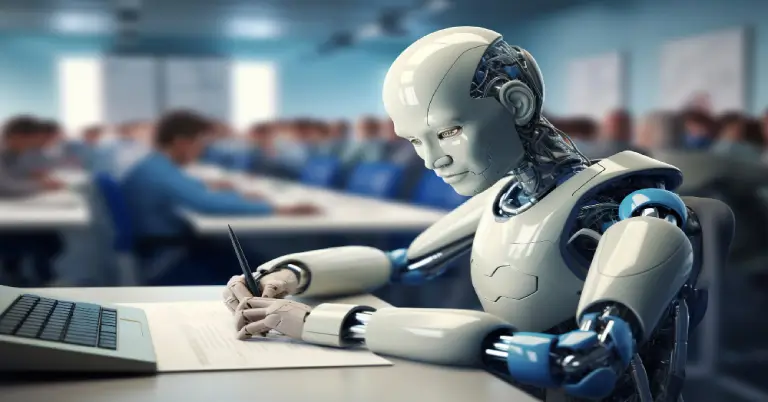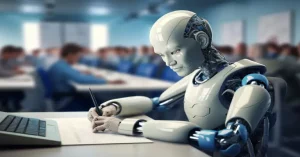How do businesses ensure that they are hiring the best talent without wasting their time and resources? The hiring process is the backbone of every successful business. The right talent at the right time will determine the growth and performance of any company. Traditional recruitment methods often take considerable time, effort, and resources. Enter AI in recruitment to change the game and transform how organizations hire and manage talent.
From recruitment process automation to personalized candidate experiences, AI is streamlining every process step. Let’s deeply understand how automation in recruitment processes is shaping the future of hiring.
What is AI in recruitment?
AI in recruitment involves using advanced technologies like machine learning, natural language processing (NLP), and predictive analytics to optimize and automate the hiring process. It helps recruiters by:
- Screening resumes efficiently.
- Matching candidates to job roles.
- Improving decision-making through data insights.
- Enhancing the overall candidate experience.
With automated recruitment processes, businesses can save time, reduce bias, and make smarter hiring decisions.
Benefits of Automating the Recruitment Process
. Quicker Hiring
Time-to-hire is reduced since tasks such as screening resumes and scheduling interviews are automated, allowing recruiters more time to get in touch with the best talent.
. Cost Reduction
Hiring manually is quite costly. Automatic recruitment processes result in a decrease in administrative costs as well as a boost in ROI.
. Better Experience for Candidates
AI-based chatbots can address candidates 24/7 hours, responding to queries and giving them information along the hiring journey.
. Bias Reduction
AI processes candidates based on skills and experience, which reduces unconscious bias.
. Improved Decision Making
AI tools analyze large datasets to provide actionable insights, helping recruiters make data-driven decisions.
Key Features of AI-Driven Recruitment Tools
.Resume Screening
AI can scan thousands of resumes in minutes, filtering through and selecting the best candidates for a particular opening according to defined parameters.
. Candidate Matching
Machine learning algorithms make AI a better candidate-matching tool than its human counterparts.
. Chatbots for Engagement
AI chatbots engage with candidates, provide them with updates, gather further information, and increase engagement.
. Predictive Analytics AI predicts how successful a candidate is likely to be based on his skills, experience, and fit into the organizational culture.
. Interview Automation AI-powered tools can schedule interviews, provide video interview platforms, and even analyze candidate responses.

Read More:
How to Automate the Recruitment Process
Step 1: Identify Recruitment Challenges
Pinpoint areas where automation can add value, such as resume screening or interview scheduling.
Step 2: Choose the Right Tools
Research and invest in AI tools that cater to your organization’s unique needs. Look for features like candidate matching, chatbot integration, and predictive analytics.
Step 3: Integration with existing systems
Make sure your selected tools have seamless integration with your ATS and other HR software.
Step 4: Train Your Team
Instruct the recruitment team on how to use these AI tools proficiently to their best advantage.
Step 5: Monitor and Optimize
Continuously monitor performance metrics and make adjustments to improve your automated recruitment processes.
Trending Applications of AI in Recruitment
1. Diversity Hiring
AI tools are used in promoting diversity by filtering out bias from job descriptions and assessments of the candidate.
2. Predictive Talent Analytics
Predictive analytics can predict hiring needs and identify candidates before the job position is open.
3. Candidate Rediscovery
AI scans previous applicants in your database to find suitable matches for current job openings.
4. Video Interview Analysis
AI can analyze video interviews to study body language, tone, and word choice and gain a more profound understanding of candidate suitability.
5. Employer Branding
The AI-driven platform allows it to build individual career pages and then give suggestions about available jobs.
6. High-Volume Recruitment
AI tools take care of mass applications smoothly and do not let any candidate be missed. Hence, hiring at a larger scale becomes more swift.
Challenges in Automating the Recruitment Process
While recruiting process automation offers many benefits, there are challenges to consider:
- High Initial Costs: Implementing AI tools can be expensive upfront.
- Data Privacy Concerns: Ensuring the security of candidate data is crucial.
- Limited Human Touch: Over-reliance on automation may affect personal interactions with candidates.
- Training Requirements: Teams need to be trained to use AI tools effectively.
- Accuracy Limitations: AI might struggle with nuanced or highly creative job roles where human judgment is essential.
Addressing these challenges with the right strategy can unlock the full potential of AI in the recruitment process.
Future of AI in Recruitment
- Hyper-PersonalizationAI will deliver even more personalized candidate experiences based on individual preferences and tailor interactions.
- Gamification in Recruitment AI-powered gamification tools will make recruitment a fun, engaging, and interactive process.
- AI-Based Retention Strategy AI will not only aid in hiring but also predict retention of employees and craft strategies for its improvement.
- Deeper analytics AI will be more advanced with workforce analytics that can predict future hiring trends and workforce requirements for a company.
- Collaboration with Other Technologies AI will integrate with technologies like blockchain for secure data management and virtual reality for immersive candidate assessments.
- Real-Time Feedback Mechanisms AI systems will collect feedback from the candidates at the time of recruitment. Thus, the company can refine their strategies at each stage of recruitment.
Conclusion
AI in recruitment is revolutionizing the hiring and talent management of businesses. By embracing the recruitment process automation, organizations reduce costs, increase efficiency, and make a better experience for the candidate and the recruiter.
Despite these obstacles, the good outweighs the bad. Whichever method can be employed for effective automation would depend on what a company is interested in or in what manner its strategic goals have incorporated technology into this process. Of course, artificial intelligence is fast becoming an indelible imprint on hiring systems. Therefore, it’s a great time for investment in these automated recruitment procedures to lead with the pack within the talent landscape.
FAQs
Q1: What is recruitment process automation?
Automation of repetitive hiring tasks, mainly screening resumes, scheduling, and communication with candidates, using technology, especially AI.
Q2: How does AI enhance recruitment?
Hiring is made faster, it reduces bias, improves decision-making, and improves the candidate experience.
Q3: Is recruitment process automation costly?
High initial costs. Long-term savings in time and resources make it a cost-effective method.
Q4: Can AI help with diversity hiring?
Yes, AI tools can remove biased language from job descriptions and evaluate candidates based solely on skills and qualifications.
Q5: What are the challenges of automating recruitment?
Challenges include high upfront costs, data privacy concerns, and the need for human oversight.












